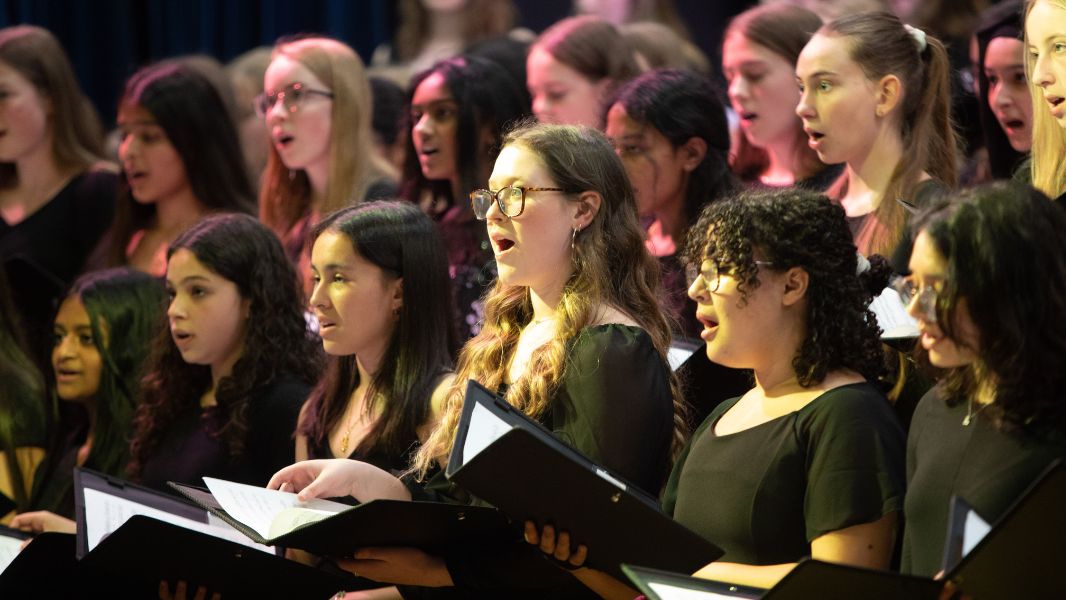Music

Music is part of the Performing Arts Faculty. As a faculty, we aim to provide opportunities within the curriculum but also opportunities for students to become remarkable musicians outside their lessons.
It is the aim of the music department that every student who enters the music department is treated as a musician, regardless of their prior experiences.
We have an active calendar of musical events and are proud of our vibrant co-curricular provision, which is supported by a strong team of peripatetic staff as well as sixth form-led ensembles. We currently have over 200 weekly peripatetic lessons taking place. As a department, we are supported by Bel Canto, a parent organisation that helps to financially and logistically support the music department to ensure we can offer more to the students.
The Music Department is equipped with two music classrooms, a recording studio and a variety of smaller practice rooms. We use the Main Hall for termly concerts. Our current Music Development Plan can be found at the bottom of this page.
Co-Curricular Enrichment
- 18+ music ensembles and choirs
- Biennial BHS Music Tour
- Annual school production
- Community performance opportunities
- Termly school concerts and carol services
- Year 7 Performing Arts Festival
- Whole school BHS Music Competition
- Participation in local and national music competitions
- ABRSM music exams
KS3 (Year 7 – 9)
Students have one music lesson a week. Our curriculum gives students significant musical experience through practical composition and performance-based study. Music lessons are practical, rigorous, theoretically grounded and contextualised. The aim is to give all students a basis for continuing their music-making beyond KS3 whether they choose to take it at GCSE level or not.
Students develop their voice and piano skills and instrumental work in lessons allows them to explore musical features in a range of styles and key features such as melody, chords and notation are taught in groups. All students are taught piano and ukulele skills and if they already play an instrument, they can use this to compose/perform.
By the end of KS3, students have a strong knowledge of musical notation and are confident in performing both solo and in ensembles.
GCSE (Year 10 – 11)
The course focuses on three elements; performance, composition and appraising. Students develop their composition and analysis skills and by the summer term of Year 11, they will have submitted two compositions and be very familiar with the areas of study required for the listening examination. There is an unseen element in the examination and students will study a variety of pieces to prepare them for this section.
Students taking GCSE Music should have considerable skill in an instrument and be at Grade 4 level on their main instrument at the start of the GCSE course. This allows students to access the highest grades in the performing component of the course. For more information on the GCSE course, download our GCSE Options Guide.
A-Level (Year 12 – 13)
A-Level Music is an incredibly diverse course, encompassing a variety of practical and academic approaches to the study of music. The varied nature of the course enables students to develop highly desirable skills in areas such as self-management, teamwork, problem-solving, and communication; all of which makes them an attractive prospective for potential universities as well as future employers.
Students should have successfully passed Grade 5 or 6 on their main instrument at the start of Year 12 and have completed ABRSM Grade 5 theory. Having some piano skills would be hugely beneficial too. Students should also be having weekly instrumental lessons and liaising with their instrumental teacher in Year 13 to put together their recital, which accounts for 30% of their final A-Level mark.
For more information on the A-Level Music course grade requirements, download a copy of the Sixth Form Prospectus and for more information on course content, download a copy of the A-Level Options Guide.

